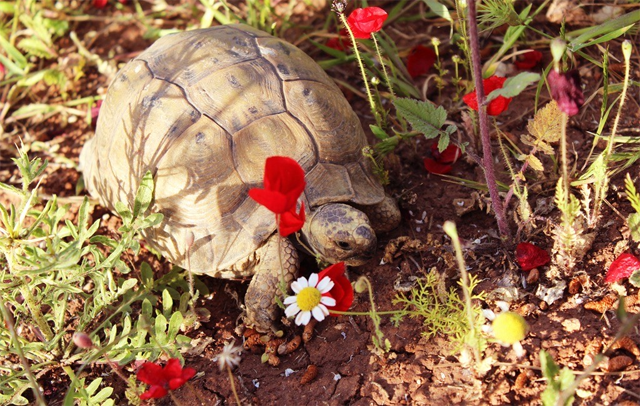Oct 15,2022

Jordan is home to two species of turtles listed on the International Union for Conservation of Nature’s Red List of Threatened Species, said Abeer Bilbeisi, CEO of JSCT (Photo Courtesy of Abeer Bilbeisi)
AMMAN — Invasive human activities combined with the effects of climate change are posing “serious” threats to the survival of turtles, both in Jordan and around the world, according to the Jordan Society for the Conservation of Turtles and Tortoises (JSCT).
Jordan is home to two species of turtles listed on the International Union for Conservation of Nature’s (IUCN) Red List of Threatened Species, which are the Striped-necked terrapin (Mauremys caspica) and Testudo graeca terrestris, according to CEO of JSCT, Abeer Bilbeisi.
“As a result of climate change, which is a threat to biodiversity, many species of plants and animals are in danger of disappearing,” she told The Jordan Times.
For example, the sex determination of sea turtle embryos is temperature-dependant, meaning that the external temperature surrounding the embryo affects the ultimate sex of the turtle. The rise in average global temperatures will lead to a highly female-skewed sex ratio, which can create an “ecological imbalance, eventually leading to their extinction”, she added.
Aside from natural phenomena, other threats, such as pollution, are a direct result of human action, according to Bilbeisi.
She also noted that “Jordan’s territorial waters contain coral reefs and seaweed beds which provide important feeding grounds” for endangered marine turtles, including the green sea turtle (Chelonia mydas) and the hawksbill turtle (Eretmochelys imbricata).
“The transfer of Aqaba’s main commercial shipping port to its new location at Dirreh Bay near the Saudi border resulted in the destruction of more than 40,000sq.m. of high-quality coral reefs. This negatively affected marine life migration and reduced the number of turtles in Jordanian waters,” Bilbeisi added.
Many hotels and tourist facilities have also “destroyed and replaced” a number of known sea turtle nesting beaches along the Jordanian coastline, she continued.
Moreover, Bilbeisi said that “the incidental capture or entanglement of sea turtles in fishing gear is also a major threat to their survival”.
Accordingly, JSCT has signed a partnership with the Association of Thagher Alordon Fishermen Agricultural Cooperative to enhance the role of fishers in protecting marine life.
“At the beginning of next year, we will be organising a training workshop for Aqaba’s fishermen, funded by the US State Department, to introduce them to eco-friendly fishing practices and provide them with the necessary tools to counter the death of by-catch sea turtles,” the JSCT CEO said.
Furthermore, turtles in Jordan face threats of poaching and illegal trade, according to Bilbeisi, who pointed out that Appendix I of the Convention on International Trade in Endangered Species of Wild Fauna and Flora (CITES), prohibits the trade of all species of marine turtles.
She also stressed that it’s important to raise public awareness about animal welfare issues, as countless turtles die from being kept as pets in inadequate conditions.
“Taking on such a responsibility requires extensive care and research. I have even learned that turtles can experience stress and depression, leading to the deterioration of their health, when they are abandoned by their owners,” she added.
Bilbeisi’s journey with turtles began roughly 20 years ago when her father found a turtle in their home garden and the family decided to keep it.
“I became very invested in taking care of it and I conducted my own extensive research to learn about turtles’ diet, anatomy, habits, and so on,” she noted.
Bilbeisi’s research led her to discover that the turtles are threatened with extinction. In 2011, she founded JSCT, the first Jordanian nonprofit organisation that aims to protect turtles and tortoises, and preserve their natural habitats.
“I now have over 30 rescued turtles in my home garden. Our goal is to establish a permanent sanctuary or reserve for endangered, neglected, abused or older turtles in need of care or rehabilitation,” she said.
The society’s work also involves conducting and publishing scientific studies on the species of turtles in Jordan. It also aims to promote environmental awareness through educational initiatives, seminars, conferences and creative recycling workshops in cooperation with local schools and universities, according to Bilbeisi.
She noted that JSCT, which is a member of the IUCN, has expanded its efforts to the global level by adopting turtles in need of medical aid outside Jordan.
https://jordantimes.com/news/local/turtles-jordan-face-‘serious’-threats-—-jsct
